- Home
- Shirley Jackson
Dark Tales Page 15
Dark Tales Read online
Page 15
By some odd coincidence every girl at the house meeting—in fact, every girl in the house—knew by the time Cheryl called the meeting to order that Miss McBride knew who the thief was, or had a clue, or meant to find out that night. Delicious apprehension made each girl tremble separately; many of them hoped that their most intimate friends would prove to be innocent; if a vote had been taken, the most likely candidate would have been Cheryl herself, just as she had been elected president of the house. As she stood in the center of the room, with the other girls around her draped over chairs and lying on the sofas and sitting on the floor, Cheryl knew perfectly well that each girl watching her imagined she saw some sign of guilt on her face.
Miss McBride spoke, soberly and earnestly. “Look, kids,” she said, “this is a terrible thing. Everyone, all over campus, knows about it by now. They’re beginning to talk about us, how we’ve got someone in this house who borrows things that don’t belong to her and then forgets to return them. It’s not good for any of you. I know you all want to protect your own reputations, and all together we want to keep this a clean and decent house. I think that the girl who is responsible for all this doesn’t quite realize that she is hurting all of us by not stepping forward.” Miss McBride stopped for a minute, but no one came forward, hand raised. “Do you think,” Miss McBride went on, “that if I said we’d all go to our rooms quietly, and then I’d wait in mine until the girl came to me—do you think that would do any good?”
There was a silence, and then one of the girls in a corner, who wanted action, said, “Not if she’s gotten away with it this far, she won’t.”
“I think I ought to tell you,” Miss McBride said significantly, “that the name of the girl is known.”
There was a dead silence of anticipation.
“I’m not going to tell you her name,” Miss McBride said firmly. “And I’m not going to tell you who saw her. All I’m going to say is that I’m going to take steps to stop this business, once and for all.”
There was another silence; Miss McBride was the one who had to take action. Miss McBride took a deep breath. “I’m going to search every room in this house,” she said with relish. “Tonight.”
There was another long silence, finally broken when one of the girls said timidly, “I don’t think you have the right to do that, Miss McBride.”
“Anyone who has anything to hide,” Miss McBride said emphatically, settling the matter once and for all, “can easily see the position she puts herself in.”
Anne, unappalled, hugged herself secretly. This was the best of all; she was perhaps the only person who had read the diary in Cheryl’s desk, seen the letters in Helena’s dresser, penetrated the secrets buried in handkerchief boxes, under beds, in the darkest corners of closets, the secrets known to be there, yet believed inviolate until a good excuse made them common currency, sometimes shocking, sometimes laughable.
“You can start with my room,” Cheryl said with dignity. There was a strong shift of sentiment toward Cheryl after this statement—unless, several of the girls wondered privately, Cheryl, as house president, had had warning of the search?
Miss McBride rose purposefully and went to the stairs, where she stopped again. “Kids,” she said, her voice lacking eagerness, “isn’t there some other way of doing this?” As she spoke, she started up the stairs. Cheryl first, and then the whole roomful of girls, followed her. Miss McBride went up to the second floor and then, after another minute’s thought, up to the third floor. Here there lived only Anne and three others.
“Whose room shall I start with?” Miss McBride asked indecisively.
“Mine,” Anne said firmly. Miss McBride, looking at Anne across the line of girls standing still in the hall, tried to make her glance meaningful. “Anne,” she was trying to say, “I know it’s all right, you’re not the thief because you won’t tell me who is; I’ve got to search your room.” Miss McBride’s gesturing eyebrows tried to say eloquently, “But we know, you and I, that it’s only a formal gesture.” She looked at Anne until all the other girls looked at her too, and then, unseen, Miss McBride shrugged helplessly at Anne.
Miss McBride, with the advice and the occasional help of the other girls, searched quickly and ineffectually. All of the drawers in the dresser and the desk were opened and their contents stirred around. “Some of the stuff was too big to really hide,” one of the girls contributed, and Miss McBride, adopting this theory into her concept of searching, made only perfunctory gestures at the bookcase and the bedcovers, although she lifted the mattress to look underneath, and one of the girls took the pillow out of its case. Anne, standing near the door, watched the girls showing curiosity about her for the second time in her life, saw a girl whom she rather admired poke hastily and surreptitiously at Anne’s dresses in the closet, saw another girl stop by the desk to read a letter Anne was writing to a high school friend. Miss McBride, at the lid of Anne’s mother’s trunk, said superfluously, “This yours, Anne?”
“My mother’s,” Anne said quietly. Miss McBride let the corner of the fur cape fall immediately from her fingers, and said questioningly to the other girls “I don’t think . . . ?”
“Of course not,” someone said uncomfortably, and the girl who had been reading Anne’s letter hurriedly dropped it back onto the desk.
“Well,” Miss McBride said, and smiled at Anne. “That’s that,” she said. She moved with purpose out of the room, and the girls followed her in a flock. Although Miss McBride moved into the next room on the floor, some of the girls separated themselves from her and could be heard, farther down the hall, instituting a search of their own in another room. Miss McBride, her searching growing more and more haphazard, went through all the rooms on the third floor; by the time she had done all four rooms she was only opening drawers and glancing into closets, but the rest of the girls were going over the rooms like locusts, reading, confusing, examining everything they could find. Talk was circulating among the group (“Did you see what they found—” “I should think she’d die—”), but the girls held together. Miss McBride said occasionally, “Now, let’s play fair, kids. No one running off to her own room.” And always, when she said this, she counted them, rapidly, at a glance.
On the second floor, Cheryl’s diary turned up, and a collection of scandalous love letters in Helena’s room, and a locket in which another girl had pasted a picture of one of her professors. The owner of the room always, without exception, stood by the door while her room was searched, ready to run if anything too awkward (something she never knew she had? perhaps something she had borrowed and not returned? perhaps something everyone would find unanimously, irresistibly funny? the stolen things, perhaps?) or too shaming turned up.
Naturally the darkroom was not searched, but Miss McBride insisted on having the girls go through her room, which, carefully prepared, disclosed nothing except a picture of a handsome young man whom Miss McBride blushingly refused to identify as either a brother or a fiancé.
When the search was over and they were all gathered together in the living room again, Miss McBride gave voice to the prevailing suspicion by saying, “Well, kids, it looks like one of you was warned in time and got rid of the stuff. But, as I told you before, we know who it is. Now I am going to say that if the girl who took these things that didn’t belong to her will come to me secretly in my room tonight, nothing more will be said.” She started for her room and then stopped to turn back and add, “Needless to say, if nothing comes of this tonight I shall have to take further steps. I had hoped”—she sighed lightly—“I had hoped to settle this here among ourselves, but if that is not possible I shall have to take further steps.” She took herself with dignity into her own room, and the girls, knowing more now than they did before, separated and went silently off to their own. No one cared to speak; each one knew the secrets of all the others; no one was inviolate any longer. It would be a long and painful process to build new privacie
s, secure them safely against intrusion, learn to trust one another again; there was a great destruction that went on in the house that night, of ruined treasures being burned, torn, cut with nail scissors. The wastebaskets taken out the next day were filled with loose torn pages and destroyed photographs, and for many days after that the girls in the house spoke rarely, and very politely, to one another.
When the house was finally quiet, Anne took out her ankle bracelet, her teddy bear and her sonnet, her pen-and-pencil set, her black slip and her leather notebook, added to them Miss McBride’s dangling jet earrings, which she had slipped into her pocket while helping search Miss McBride’s room, and set them in a row on her bed. All together, they were barely enough to fill a tiny overnight bag, so Anne stopped off in the house living room to slip three or four metal ashtrays into the bag with them. She stood for a minute just inside the front door, surveying the house, which was silent, with all its doors shut; it was her first minute of unalloyed pleasure since her mother’s funeral. Then she slipped quickly out the front door and down the street, carrying the overnight bag; mighty, armed.
A Visit
(for Dylan Thomas)
1
The house in itself was, even before anything had happened there, as lovely a thing as she had ever seen. Set among its lavish grounds, with a park and a river and a wooded hill surrounding it, and carefully planned and tended gardens close upon all sides, it lay upon the hills as though it were something too precious to be seen by everyone; Margaret’s very coming there had been a product of such elaborate arrangement, and such letters to and fro, and such meetings and hopings and wishings, that when she alighted with Carla Rhodes at the doorway of Carla’s home, she felt that she too had come home, to a place striven for and earned. Carla stopped before the doorway and stood for a minute, looking first behind her, at the vast reaching gardens and the green lawn going down to the river, and the soft hills beyond, and then at the perfect grace of the house, showing so clearly the long-boned structure within, the curving staircases and the arched doorways and the tall thin lines of steadying beams, all of it resting back against the hills, and up, past rows of windows and the flying lines of the roof, on, to the tower—Carla stopped, and looked, and smiled, and then turned and said, “Welcome, Margaret.”
“It’s a lovely house,” Margaret said, and felt that she had much better have said nothing.
The doors were opened and Margaret, touching as she went the warm head of a stone faun beside her, passed inside. Carla, following, greeted the servants by name, and was welcomed with reserved pleasure; they stood for a minute on the rose-and-white- tiled floor. “Again, welcome, Margaret,” Carla said.
Far ahead of them the great stairway soared upward, held to the hall where they stood by only the slimmest of carved balustrades; on Margaret’s left hand a tapestry moved softly as the door behind was closed. She could see the fine threads of the weave, and the light colors, but she could not have told the picture unless she went far away, perhaps as far away as the staircase, and looked at it from there; perhaps, she thought, from halfway up the stairway this great hall, and perhaps the whole house, is visible, as a complete body of story together, all joined and in sequence. Or perhaps I shall be allowed to move slowly from one thing to another, observing each, or would that take all the time of my visit?
“I never saw anything so lovely,” she said to Carla, and Carla smiled.
“Come and meet my mama,” Carla said.
They went through doors at the right, and Margaret, before she could see the light room she went into, was stricken with fear at meeting the owners of the house and the park and the river, and as she went beside Carla she kept her eyes down.
“Mama,” said Carla, “this is Margaret, from school.”
“Margaret,” said Carla’s mother, and smiled at Margaret kindly. “We are very glad you were able to come.”
She was a tall lady wearing pale green and pale blue, and Margaret said as gracefully as she could, “Thank you, Mrs. Rhodes; I am very grateful for having been invited.”
“Surely,” said Mrs. Rhodes softly, “surely my daughter’s friend Margaret from school should be welcome here; surely we should be grateful that she has come.”
“Thank you, Mrs. Rhodes,” Margaret said, not knowing how she was answering, but knowing that she was grateful.
When Mrs. Rhodes turned her kind eyes on her daughter, Margaret was at last able to look at the room where she stood next to her friend; it was a pale-green and a pale-blue long room with tall windows that looked out onto the lawn and the sky, and thin colored china ornaments on the mantel. Mrs. Rhodes had left her needlepoint when they came in and from where Margaret stood she could see the pale sweet pattern from the underside; all soft colors it was, melting into one another endlessly, and not finished. On the table nearby were books, and one large book of sketches that were most certainly Carla’s; Carla’s harp stood next to the windows, and beyond one window were marble steps outside, going shallowly down to a fountain, where water moved in the sunlight. Margaret thought of her own embroidery—a pair of slippers she was working for her friend—and knew that she should never be able to bring it into this room, where Mrs. Rhodes’s long white hands rested on the needlepoint frame, soft as dust on the pale colors.
“Come,” said Carla, taking Margaret’s hand in her own, “Mama has said that I might show you some of the house.”
They went out again into the hall, across the rose and white tiles which made a pattern too large to be seen from the floor, and through a doorway where tiny bronze fauns grinned at them from the carving. The first room that they went into was all gold, with gilt on the window frames and on the legs of the chairs and tables, and the small chairs standing on the yellow carpet were made of gold brocade with small gilded backs, and on the wall were more tapestries showing the house as it looked in the sunlight with even the trees around it shining, and these tapestries were let into the wall and edged with thin gilded frames.
“There is so much tapestry,” Margaret said.
“In every room,” Carla agreed. “Mama has embroidered all the hangings for her own room, the room where she writes her letters. The other tapestries were done by my grandmamas and my great-grandmamas and my great-great-grandmamas.”
The next room was silver, and the small chairs were of silver brocade with narrow silvered backs, and the tapestries on the walls of this room were edged with silver frames and showed the house in moonlight, with the white light shining on the stones and the windows glittering.
“Who uses these rooms?” Margaret asked.
“No one,” Carla said.
They passed then into a room where everything grew smaller as they looked at it: the mirrors on both sides of the room showed the door opening and Margaret and Carla coming through, and then, reflected, a smaller door opening and a small Margaret and a smaller Carla coming through, and then, reflected again, a still smaller door and Margaret and Carla, and so on, endlessly, Margaret and Carla diminishing and reflecting. There was a table here and nesting under it another lesser table, and under that another one, and another under that one, and on the greatest table lay a carved wooden bowl holding within it another carved wooden bowl, and another within that, and another within that one. The tapestries in this room were of the house reflected in the lake, and the tapestries themselves were reflected, in and out, among the mirrors on the wall, with the house in the tapestries reflected in the lake.
This room frightened Margaret rather, because it was so difficult for her to tell what was in it and what was not, and how far in any direction she might easily move, and she backed out hastily, pushing Carla behind her. They turned from here into another doorway which led them out again into the great hall under the soaring staircase, and Carla said, “We had better go upstairs and see your room; we can see more of the house another time. We have plenty of time, after all,” and she squeezed Margare
t’s hand joyfully.
They climbed the great staircase, and passed, in the hall upstairs, Carla’s room, which was like the inside of a shell in pale colors, with lilacs on the table, and the fragrance of the lilacs followed them as they went down the halls.
The sound of their shoes on the polished floor was like rain, but the sun came in on them wherever they went. “Here,” Carla said, opening a door, “is where we have breakfast when it is warm; here,” opening another door, “is the passage to the room where Mama does her letters. And that—” nodding “—is the stairway to the tower, and here is where we shall have dances when my brother comes home.”
“A real tower?” Margaret said.
“And here,” Carla said, “is the old schoolroom, and my brother and I studied here before he went away, and I stayed on alone studying here until it was time for me to come to school and meet you.”
“Can we go up into the tower?” Margaret asked.
“Down here, at the end of the hall,” Carla said, “is where all my grandpapas and my grandmamas and my great-great-grandpapas and grandmamas live.” She opened the door to the long gallery, where pictures of tall old people in lace and pale waistcoats leaned down to stare at Margaret and Carla. And then, to a walk at the top of the house, where they leaned over and looked at the ground below and the tower above, and Margaret looked at the gray stone of the tower and wondered who lived there, and Carla pointed out where the river ran far below, far away, and said they should walk there tomorrow.
“When my brother comes,” she said, “he will take us boating on the river.”
In her room, unpacking her clothes, Margaret realized that her white dress was the only one possible for dinner, and thought that she would have to send home for more things; she had intended to wear her ordinary gray downstairs most evenings before Carla’s brother came, but knew she could not when she saw Carla in light blue, with pearls around her neck. When Margaret and Carla came into the drawing room before dinner Mrs. Rhodes greeted them very kindly, and asked had Margaret seen the painted room or the room with the tiles?

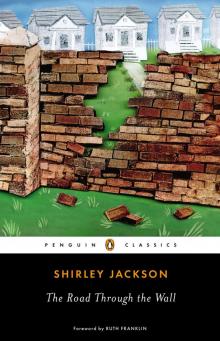 The Road Through the Wall
The Road Through the Wall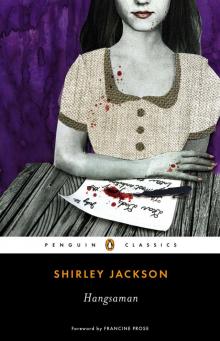 Hangsaman
Hangsaman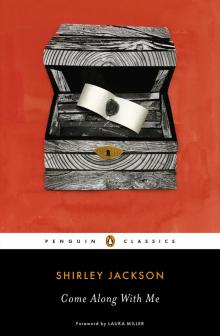 Come Along With Me
Come Along With Me The Lottery
The Lottery Just an Ordinary Day: Stories
Just an Ordinary Day: Stories The Sundial
The Sundial Dark Tales
Dark Tales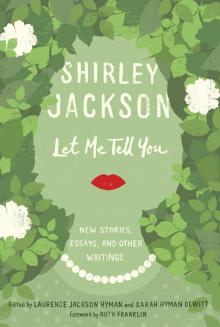 Let Me Tell You: New Stories, Essays, and Other Writings
Let Me Tell You: New Stories, Essays, and Other Writings The Haunting of Hill House
The Haunting of Hill House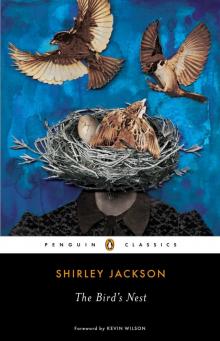 The Bird's Nest
The Bird's Nest Raising Demons
Raising Demons We Have Always Lived in the Castle
We Have Always Lived in the Castle The Letters of Shirley Jackson
The Letters of Shirley Jackson The Missing Girl
The Missing Girl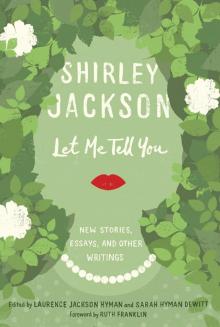 Let Me Tell You
Let Me Tell You